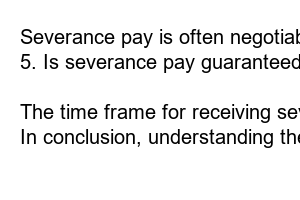퇴직금 조회
Title: The Essential Guide to Severance Pay Inquiry: What You Need to Know
Introduction:
In the midst of stressful job transitions or unexpected terminations, it’s vital to be equipped with a thorough understanding of severance pay. Whether you’re an employee seeking clarity or an employer aiming to establish fair compensation practices, this blog post will provide comprehensive insights into the nuances of severance pay inquiry.
1. What is Severance Pay?
Severance pay refers to the compensation granted to an employee upon termination of their employment, beyond the regular salary. It acts as a financial cushion, helping individuals during the transition period until they secure a new job.
2. Eligibility for Severance Pay:
Eligibility for severance pay varies depending on various factors, such as employment duration, contractual agreements, and applicable laws. Generally, permanent employees who are laid off or terminated for reasons other than misconduct are entitled to receive severance pay.
3. Determining Severance Pay:
Severance pay can differ based on several factors, including the employee’s position, length of service, company policies, and negotiations. It is often calculated using a formula that incorporates the employee’s salary, years of service, and other relevant factors.
4. Common Components of Severance Pay:
Severance packages typically include monetary compensation, extended benefits such as healthcare coverage, outplacement services, and other customized offerings. The specifics may vary depending on the employer and the circumstances of the termination.
5. Legal Considerations:
Employment laws and regulations differ across jurisdictions, establishing the minimum entitlements regarding severance pay. It is crucial to familiarize oneself with local labour laws or consult legal professionals to ensure compliance and avoid potential litigation.
6. How to Initiate a Severance Pay Inquiry:
When inquiring about severance pay, be proactive and approach the human resources department or your supervisor for a clear understanding of the policies and processes in place. Communicate respectfully, citing applicable employment laws or provisions if necessary, to facilitate an open dialogue.
7. Negotiating Severance Pay:
In certain situations, negotiation can help enhance the severance package. With thorough research, preparation, and professional guidance, employees can explore options for maximizing their entitlements, considering factors such as future employment prospects and individual needs.
FAQs:
1. Do all employees receive severance pay?
While severance pay isn’t mandatory in all cases, it is common for organizations to offer it as a gesture of goodwill and to maintain employee relations.
2. Can severance pay be taxed?
Severance pay may be subjected to taxation; the specific tax laws and regulations governing it depend on your jurisdiction.
3. Can severance pay affect unemployment benefits?
Severance pay may have implications on unemployment benefits, as it typically replaces those benefits during the period received. Be sure to consult relevant authorities or legal professionals to understand the impact.
4. Can severance pay be negotiable?
Severance pay is often negotiable, especially in cases where an employee has specialized skills or the termination is contentious. Negotiation skills and professional advice can significantly influence the outcome.
5. Is severance pay guaranteed in a layoff situation?
Severance pay is not an automatic entitlement, especially during layoffs. However, employers often provide it to maintain employee morale and reputation.
6. How long does it take to receive severance pay?
The time frame for receiving severance pay varies depending on factors such as company policies, negotiation process, and local employment laws. It is advisable to clarify this during the inquiry process.
In conclusion, understanding the nuances of severance pay can significantly impact your financial stability during job transitions. By proactively exploring your entitlements, engaging in respectful dialogue, and considering legal regulations, you can navigate the process with confidence and maximize your outcomes.

